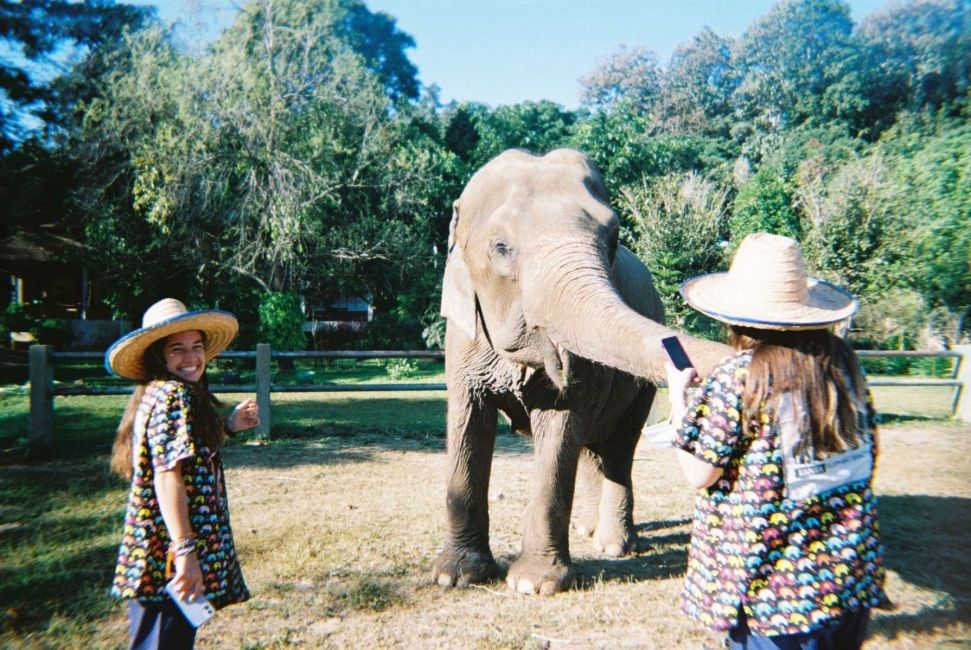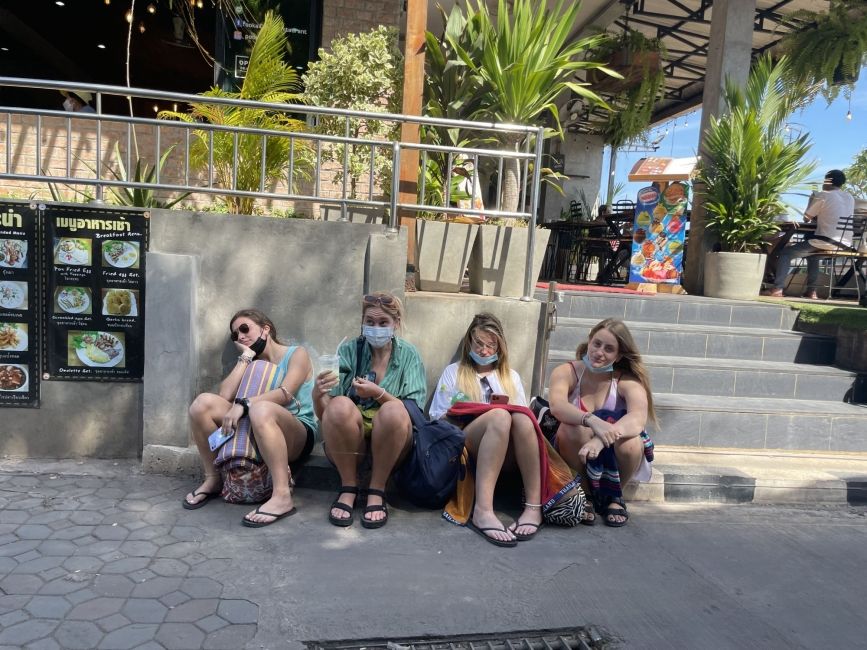The Four Stages of Culture Shock
Culture. All the different attitudes, values, beliefs and behaviors that we share with people who follow the same ideas that we do. We live it, love it, breathe it. It's everywhere that we go and in everything that we do. So it's really no surprise that it shocks the heck out of you to be taken away from all those things so habitual to you and thrown into a culture completely brand new.
Just like anything that takes time to adjust to (relationships, grief, development), culture shock comes in stages. There are four different ones that people go through, and it's safe to say that we hit them pretty hard and pretty fast.
Stage I: Honeymoon - The initial euphoria and excitement. I mean, c'mon, just LOOK at this place. The sun is always shining, the palm trees are swaying in the breeze, the smell of fresh street food fills the air, and people smile whenever they walk by. Talk about living on vacation! Often this stage happens before new travelers have contact with real locals and non-touristy areas. We definitely lived this throughout our time in Bangkok. During our orientation, we were so willing to learn the Thai language and figure out what phrases to use on the rare occasion that someone didn't speak English (if they teach it in school here, doesn't everybody know it?). We were feeling adventurous with eating and made sure to try different foreign meals off of the menu every night (can't everything be made with a special request when you're a paying customer?). We were becoming experts at getting around town and using the Sky Train to go to and from as we pleased (isn't every mode of public transport so easy to use?). We were tearing up the town by singing karaoke and dancing the night away on free booze (who doesn't love a tipsy foreigner?). We were feeling all the way up hanging with our new best friends and having all the baht in the world to spend, so where could we possibly go from here?
Stage II: Frustration - Down. Like way down. We had to leave Bangkok and move to our new towns. Don't get me wrong; the sun still shines, the palm trees still sway, the food is still fresh, and the smiles are there, but so are lots of locals and none of the tourists. It was fun to pick up on the commonly used Thai words that stuck easily, but now suddenly no one speaks fluent English and you have no clue how to ask for help. The street cart food is getting old quickly because as delicious as it tastes, the same things are being served everyday. (Plus, the meat isn't always cooked as thoroughly as it is at home, so your stomach is having a little bit of culture shock too). There is no Sky Train here, all the signs are in Thai so you never really know which direction you're going, and it takes several tries to even book a Grab to come pick you up. The night life is shut down completely in small cities, due to COVID, so the closest thing you're going to get to a wild weekend is a can of beer from the nearest 7/11. All of your friends live in different towns around the country, some only reachable by plane, and with that stack of baht quickly dwindling, it doesn't seem like you're going to be booking a flight anytime soon. Is it time to go home yet?
Stage III: Adjustment - But this IS home! Anywhere can be home, as long as you're willing to find the comfort in it. Part of this comes from making sure that you check yourself. There have been so many instances where I come across something that is done differently than I would see at home, and I immediately think to myself, 'that's so weird.' But it's NOT weird. It's just different than what I'm used to, and that's okay! Isn't that why we travel? To see different things, to experience different cultures, to feel different ways? When fighting culture shock, attitude is 100% of the battle. I'm not gonna lie, this is something that's hard to realize, it took me a while. There was a two week stretch where I felt lonely and bored all the time, I couldn't help but wonder if I made the right choice in coming here. But then it finally hit me- it's not what you see, it's how you see it. As difficult as the communication barrier can be, it's also an opportunity to learn another language and expand my knowledge. Sure, the street carts are the same every night, but so are the friendly people working at them who will remember your order and even throw in a little extra scoop sometimes. Maybe the Grab takes a while to arrive, but what's the rush? It's totally worth the wait when you're sitting on the back of a motorbike or playing real life Mario Kart in a tuk tuk instead of being stuck inside a car like usual. So what if we can't hit the clubs at night? It's given us a chance to have a fun night in with our new co-teachers, sharing a bottle of wine and bonding over funny stories from the work week. (Not to mention saving money!) It's definitely a bummer to not live in walking distance from our friends anymore, but now we have the perfect excuse to book a weekend trip and see more of what this beautiful country has to offer. (Especially since the first paycheck hit and we are back on track with our budgeting!) Now we're recognizing people and places and things, we're finally starting to fit in.
Stage IV: Acceptance - This is it, this is life. Scratch that. This is THE life. You're doing the d*mn thing! Think back to all the reactions you got when you told people you were going to move across the world to teach abroad- confusion, concern, disbelief. It's hard for some to believe that anyone could be bold enough to just pick-up and go. Maybe it's not the "right" way of doing things post-grad, but it's certainly not wrong! What people consider to be "right" is what they consider to be "normal", like scoring that 9-5 that you can work your way up the ladder of hierarchy in over the next thirty years. But guess what? It's not NOT normal to take this big adventure, it's just different. And if doing something so different makes you happy, then it IS the right thing to do. It's challenging, it's ever-changing, it's exhausting, but it's exciting. Once you can accept all the things that have changed, you can really start to live. Then, you know all those people always smiling? You become one of them. You look back on your first few weeks and you know that your feelings were valid at the time, but you also get a sense of pride in the fact that you took the steps to stop being sad, stop being lonely, stop being bored, and to just simply be. That's the most important thing you can do.
I'm writing this post just a few days short of my two month mark of living in Thailand. It wasn't until yesterday that I finally hit the acceptance stage. My roommate Nikky and I were sitting in one of our favorite local restaurants eating fried rice for breakfast (NOT weird, different!) and reflecting on our time here so far. Much of what I wrote in my adjustment and acceptance sections was paraphrased from our conversation. It took us almost SIXTY DAYS to get to this point. For some it might happen sooner, and for some it may take even longer. But the point is, it doesn't matter when you get there, it's that eventually, you do. It doesn't matter how much traveling you've done before or how accepting of change you can be, culture shock plays no favoritism. It's something that comes and hits you (maybe like a breeze, maybe like a truck), and you can try to run away from it, or you can embrace it. Most of all, know that you can do it, and when you're back at home several months later, reflecting on your experience living and teaching in a new culture, you'll be happy that you did.
Related Posts

Thailand Through the Eyes of My 12th Grade Thai Students
What makes Thailand truly unique beyond its temples and street food? In this reflection, my 12th grade students in Thailand share what their country looks like from the inside — not as a tourist destination, but as home. Through their honest words, we see how Thai culture balances tradition and modern life, how respect, family values, and kindness shape daily experiences. Their perspectives offer an authentic glimpse into Thai society through the eyes of the next generation.

How Schools Shape Students in Thailand: A word from my students
What does school truly teach beyond textbooks and exams? In this reflection, three Thai students offer an inside look at how education shapes not only their academic futures, but their character and identity. Through their voices, we see that Thai schools function as more than places of learning — they are spaces where discipline, ambition, cultural pride, and respect are carefully cultivated. From the belief that education determines one’s future, to the daily practice of courtesy and social harmony, these students reveal how Thai education prepares young people not just for university, but for life. Their perspectives offer a powerful reminder that schools reflect the values of the society they serve.
My Halfway Mark: 5 Things I've Learned Teaching In Thailand
At the halfway point of my journey teaching in Thailand, I’ve realized this experience is about far more than lesson plans and classrooms. It is about adaptability, humility, courage, and connection. In this reflection, I share the five most important lessons I’ve learned so far, from learning to “be like water” in moments of uncertainty to saying yes to opportunities that push you beyond your comfort zone. This is not just advice for teachers in Thailand. It is a reminder that when you give your whole heart to a community, embrace growth, and choose courage daily, the experience will transform you in ways you never expected.




